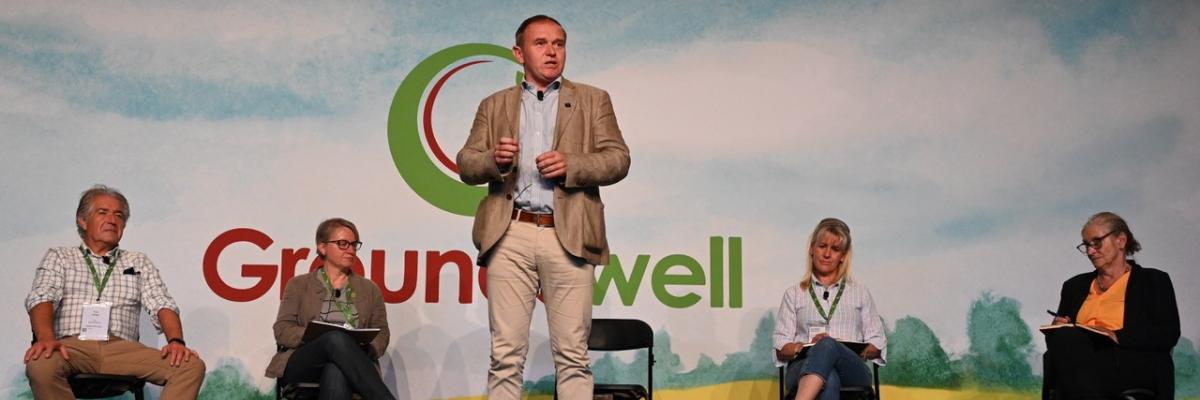
George Eustice shares the stage on day two at Groundswell
29 June 2022
From June 30th 2022 all farmers can sign up to SFI, the Sustainable Farming Incentive. There is no time limit for the application, farmers can enrol at any point in time and, if accepted, they can expect their first cheque three months later. With the big and long expected announcement out of the way, together with some praise for the work of his department and some scathing comments on the ineptness of the EU agricultural policies and the woes of formfilling, the Secretary of State was ready to move on and "talk soil", which, incidentally, will be the focus of the first SFI phase.
George Eustice shared the stage, among others, with NFU president Minette Batters who vowed to be "on best behaviour." She then plunged right into what was one of the hottest Groundswell topics: soil carbon, how to measure it, whether to remunerate farmers for sequestering it, and if so, how to go about it. It was necessary to establish a baseline on farms, said Batters, but to do so “we need one tool”, preferably the same as will be used in Scotland and Wales. Only then the metrics could be worked out. If the Government failed to get a grip on the issue “wild west desk top analysts from private equity companies will be riding off in to the sunset with the value of our soils.”
Asked at an informal press talk later whether Defra would launch a farm and grassland code similar to the Woodland Carbon Code1, Eustice said a report on ‘Green Finance’ would likely be published towards the end of the year. In the meantime, his advice to farmers desperate to make up for the financial shortfall caused by the cuts to (and eventual complete loss of) the BPS who contemplate entering a carbon farming agreement right now: “It’s an embryonic industry, farmers should get legal advice before signing up.”
“We want more and more and more from our farmers and no one is willing to pay for it” said Batters to applause from the audience. It was time to talk about fair pricing for what farmers deliver, both in terms of food and for the environment. George Eustice wasn’t to be drawn in to a fair price debate. But during a second panel the Defra Secretary explained that, to him, regenerative agriculture was a successful, resilient, profitable way of farming in line with environmental goals. Just the right fit for the Sustainable Farming Incentive. And as land agents such as Natural England and agronomists were already working with farmers, he could envisage that such organisations, companies and individuals could also become licensed to audit SFI standards. Not a view Ian Davis, the farmer on the panel, shared: Were farmers really expected to believe that the advisors “who got us in to the current situation will now pivot and give us good advice on regenerative agriculture? Let alone licence them to audit?” Some advisors were really good and helpful, but a lot of commercial companies were not.
Davis was equally unimpressed with Eustice’s idea that technology would help to fix environmental problems. The Defra secretary repeatedly referred to the development of a technology that captures methane from slurry pits that can be bottled and used as fuel for a (New Holland) tractor modified to run on methane. Davis doesn’t have much faith in technical solutions, “If regenerative agriculture is to be taken up, it is through peer to peer knowledge rather than advisors.” A fitting reminder to the Secretary of State and company representatives present as to why farmers come to Groundswell.
Marianne Landzettel is a journalist and author, writing and blogging about food, farming and agricultural policies
|
Watch the recording of the policy hour speech from the Secretary of State George Eustice including an update on the progress on ELMS, followed by a debate chaired by Baroness Rosie Boycott with Tony Juniper, Minette Batters and Baroness Natalie Bennett:
|
|
Watch the second Groundswell 2022 session featuring Secretary of State George Eustice, farmer Ian Davis, Henry Dimbleby, Ruth Edwards MP and Sir Oliver Heald QC 'What can plicy makers do to support regenerative farming?' here:
|
1 The Woodland Carbon Code (WCC) is the quality assurance standard for woodland creation projects in the UK, and generates independently verified carbon units. Backed by the Government, the forest industry and carbon market experts, the Code is unique in providing woodland carbon units right here in the UK. (See https://woodlandcarboncode.org.uk/)
Header image © M.Kunz


